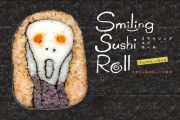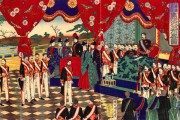Japanese history textbooks have frequently been the centre of various textbook controversies, but these have generally been confined to modern history, and in particular Japan’s actions in relation to other nations in Asia during the Asia-Pacific War.
But now, recent editions of an historical textbook appear to completely re-evaluate the reputations of important historical figures from pre-modern Japanese history, with some rising in prominence while others fade into obscurity.
In particular, 2ch.net netizens have focused on the character of the Tokugawa Shogun Tokugawa Tsunayoshi, who was known for his “Edict of Compassion For All Living Things”, meaning that he has largely been remembered as the “dog shogun” for the effect the edict had on stray dogs. While some point out that this edict led to a greater respect for all life, including human life, others are discontent with the reappraisal of a man previously known as a tyrant.
From News Post Seven:
Textbook Revisions Judge Tokugawa Tsunayoshi’s “Edict of Compassion For All Living Things” As A Politics Of Love
In the history textbooks that are currently being used in Japanese schools, Prince Shotoku’s achievements and actual existence are being brought into question, and the date in which the Kamakura Shogunate was established is no longer taken as 1192. So it’s no longer “The Kamakura Shogunate created a i-i-ku-ni [mnemonic for the year 1192; sounds like “good nation”]”, but rather “The Kamakura Shogunate created a i-i-ha-ko [mnemonic for the year 1185; no pun, sounds like “good box”]”.
And the remarkable thing about the changes in the textbooks is the contrast in character evaluations, between “people who have gone up” and “people who have gone down”.
Prince Shotoku is perhaps a typical example of a “person who has gone down”, with his very existence having been brought into question, but Ono no Imoko, who was assumed to be the envoy who first crossed over to Sui dynasty China, and delivered Prince Shotoku’s letter to the Chinese emperor, is also an example of a person whose stock has fallen.
There are probably a lot of readers who have remembered the pun “mu-rei-na [mnemonic for the year 607; sounds like “rude”] envoy Ono no Imoko”, but in the Yamakawa Publishing company’s version of the history textbook, it states that “carrying on from envoys sent from the year 600 onward, Ono no Imoko crossed to China as Japan’s envoy to Sui dynasty China in 607”, specifying that Ono was not the first Japanese envoy to Sui China, and what was once written in bold letters, is now relegated to small print. Since the existence of Prince Shotoku, who entrusted the letter taken to Sui China to Ono, is doubted, it is probably that in future editions of the textbook his name might be erased altogether.
Still, there are also historical figures whose reputations have, conversely, improved as a result of historical research.
Ishida Mitsunari, who organised the Western army in the Battle of Sekigahara, is described as something of a villain in the 1988 edition of the textbook: “Ishida Mitsunari, one of the Five Commissioners, is considered along with Konishi Yukinaga and others, to have raised an army and attempted to oust Tokugawa Ieyasu“. However, in the current edition, it has been revised to say that Ishida’s side were also righteous in their actions: “The opposition between Ieyasu and Ishida Mitsunari, who was attempting to carry on the Toyotomi government, came to a head”.
Someone whose evaluation rose dramatically was the Edo Shogunate‘s 5th Shogun, Tokugawa Tsunayoshi. The 1988 edition of the textbook has the following:
“When he gave the Edict of Compassion for All Living Things, which ordered the protection of dogs and wildlife, and then strictly enforced it, Tsunayoshi exacerbated the peasant’s discontent”; “Tsunayoshi came to live a very luxurious lifestyle, and carried out the construction and repair of many temples and shrines due to his belief in Buddhism, causing the financial situation of the Shogunate deteriorate rapidly”.
This emphasised the impression of Tsunayoshi the tyrant that everyone is familiar with, but in the current version, this has changed completely:
“Because Tsunayoshi treated dogs with care, the savage situation which was commonplace for stray dogs completely disappeared,” and Tsunayoshi’s “Edict of Compassion For All Living Things”, which had come to be known as a bad law, is even praised as “A politics of love by Tsunayoshi’s government”. The author of “Japanese History That Has Disappeared From Textbooks”, Bunkyo University High School teacher Kawai Atsushi, says that “There is no historical figure whose evaluation in textbooks has changed so much as that of Tsunayoshi, due to recent research”.
Just as Tokugawa Yoshimune became the “wild shogun”, the day is probably close by when Tsunayoshi the “compassionate shogun” gets his own historical drama.
This article appears in the April 19 2013 edition of Shukan Post.
Comments from 2ch.net:
名無しさん@13周年:
In Tsunayoshi’s time, if you killed a fly you’d have to commit seppuku w
名無しさん@13周年:
So fucked up…
名無しさん@13周年:
That’s just the nature of history. It can be rewritten.
名無しさん@13周年:
Isn’t the fact that he made peasants suffer a bigger issue that the fact that he reduced the number of stray dogs? Why is the textbook written from the perspective of stray dogs? This is the proof that these traitorous bastards are writing history that focuses on dogs instead of people!
名無しさん@13周年:
I’m not sure about all this “love” stuff, but it was true that this was a strategy against stray dogs during the Edo period.
ロンメル銭湯兵 ◆JAlCYz0cLBMK :
I read this in some book, but it said that Tsunayoshi was a revolutionary figure who changed the murderous climate of the Warring States Period. Had there been no Edict of Compassion for All Living Things, then it’s probably that the Edo period wouldn’t have lasted as long as it did. Personally, because they didn’t cover Asano Takuminokami’s feelings properly, it’s a pretty basic level.
名無しさん@13周年:
It’s weird because they’re judging history based on modern values.
名無しさん@13周年:
Is it OK to sentence the people who wrote the textbooks to death if they kill a bug?
名無しさん@13周年:
The thing is, in the Edo period the samurai will still going around slaughtering peasants without a care, just to test their new swords. Plus even Toyotomi would hunt down fleeing warriors from defeated armies, so until around the time of Tsunayoshi, human lives were worth about the same as the animals around them.
名無しさん@13周年:
Being kind to dogs is fine, but isn’t it a fact from documents of the time that Tsunayoshi prioritised animals when citizens were being oppressed?
名無しさん@13周年:
It’s only recently that we’ve learned that from the time of Tsunayoshi’s rule, the morals of the people apparently improved dramatically.
名無しさん@13周年:
Was the purpose of this just to mess up Japanese history and education?
名無しさん@13周年:
The thing is, living things isn’t just limited to beasts, it also includes humans! w
The image of him as the foolish dog shogun is one that was planted later ww
During the decades of his reign, they say that there were also only a few tens of people who received capital punishment because of the edict for living things ww
名無しさん@13周年:
Personally, I don’t think his reputation was all that bad, but the Edict of Compassion for All Living Things was a bad law…
名無しさん@13周年:
Why can’t they just write the facts? It gets screwed up because they attach these speculative commentaries.
名無しさん@13周年:
You should bloody well write at the end of the text book that “It’s up to you whether you believe this or not”.











